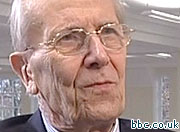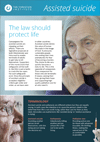An upcoming assisted suicide Bill could open the door to further liberalisation of the law, former Cabinet Minister Norman Tebbit has warned.
Lord Tebbit compared the Bill to abortion legislation introduced in the 1960s, when its advocates believed it would not lead to widespread abortion.
Now, however, numerous concerns have been raised over issues including recent Conservative guidance that allows patients to have an abortion without seeing doctors.
There were 203,419 abortions in 2012 in Great Britain, figures from the Department of Health show.
Euthanasia
Writing on the Telegraph’s website, Lord Tebbit drew a parallel with Lord Falconer’s ‘Assisted Dying’ Bill.
He said he was sure it is “not the intention” of Lord Falconer to “set us on that slippery slope to involuntary euthanasia”.
Lord Tebbit warned, however, that if the legislation was passed it would become a “stalking horse” for those who backed such moves.
Vultures
He then raised concerns that a change in the law would put pressure on people to die, recalling a story of a woman who suggested that the people around her were like vultures, circling her inheritance.
She told Lord Tebbit she would like her estate to go to an Armed Forces charity and said she had “no children”, but “several vultures”.
Lord Tebbit concluded: “I fear that should Lord Falconer’s Bill become law a good many vultures would look forward to earlier pickings than they dare to do today.”
The Assisted Dying Bill would mean doctors could help people kill themselves if the patient had less than six months to live.
The Bill is expected to have its second reading in the House of Lords this summer.
Dangerous
Last week, Baroness Campbell of Surbiton said it would be “dangerous” to legalise assisted suicide now, because vulnerable people could feel pressure to die in the wake of the recession.
In 2013 three senior legal authorities criticised Lord Falconer’s Bill, saying there are a lack of protections for vulnerable people.
Baroness Butler-Sloss, the former head of the High Court Family Division, Lord Carlile QC and Lord Brennan QC said the Bill contains no protections for assessing assisted suicide requests, leaving the “real safeguards” to be decided after it has been approved by politicians.


